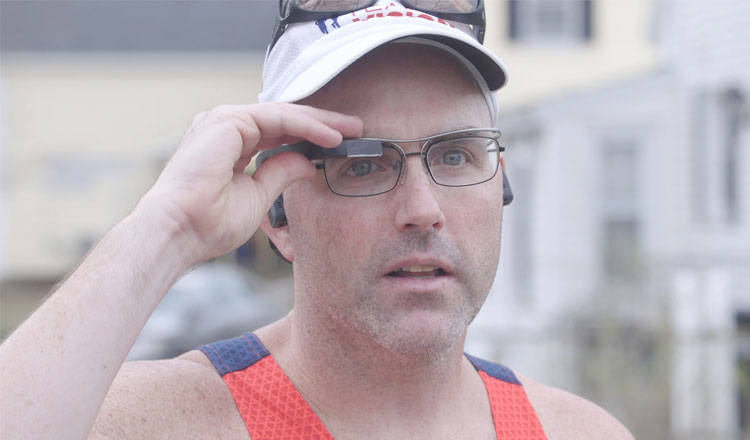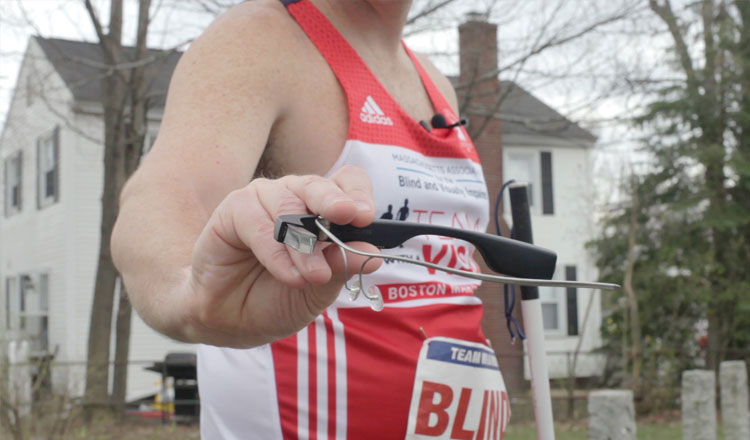Near-blind Runner Takes on Marathon with Smart Glasses
By: Chris Morgan, AT&T Insider
Erich Manser compares his fading vision to peering through a drinking straw that's covered by wax paper.
But when he runs in the Boston Marathon today, Erich will navigate with an extra pair of eyes -- ones located across the country.
Using our network, his smartphone and the camera on his smart glasses, Erich will connect with an Aira agent in Ohio. Her job is to "see" what Erich's smart glasses see. She then verbally tells Erich what is happening in near real time. She will help him avoid the cracks, the zig-zagging runners and flying water cups, so Erich can focus on the race.
"I am fascinated and very excited about the Aira solutions in general," Erich said.
Our collaboration with the startup Aira began at the AT&T Foundry for Connected Health in Houston, where we work to bring connected and integrated healthcare solutions to the market. In January, we announced that we are providing wireless connectivity to support Aira's innovative platform.
Providing connectivity for the startup Aira is a great example of how Internet of Things technology can help solve problems and improve lives, said Chris Penrose, who heads our Internet of Things Solutions. In all, we connected more than 30 million "things" – or connected devices – to our network as of 4Q16.
Today marks Erich's eighth Boston Marathon and Aira's first.
Erich has used Aira glasses to run alone in a well-known loop near his home. But Erich said the Boston Marathon will be a true test for Aira (pronounced eye-ra.)
"When you are packed in and you have runners who, in a millisecond, appear out of nowhere, the ability to communicate quickly is going to be important," he said.
"Whereas on my country road runs, basically, Jessica (the Aira agent) and I have been chitchatting, just kind of shooting the breeze and observing. 'OK, there's a person walking the dog' or 'Careful, there's a shoulder to this road on your left. So you don't want to veer too far to the left.'"
Erich was diagnosed at age 5 with retinitis pigmentosa, a degenerative eye disease. "The peripheral vision continues to close in over time until you have nothing left," he said. "So it does lead to blindness."
Erich was a swimmer when he was growing up, but took to running – in a big way – when he began working and gaining weight. Besides 17 marathons, Erich also has completed an Ironman race: swimming 2.4 miles, biking 112 miles and running a full marathon.
A resident of Littleton, Massachusetts, Erich works for IBM and specializes in accessibility research. Among his projects is the self-driving car, which Erich says offers a lot of potential for people who can't drive themselves.
A connection to independence
Erich first tried the Aira technology at a convention for blind people last summer. He quickly used it to find a restaurant for lunch. Erich was sold.
"It was very compelling. I wouldn't say I was walking effortlessly, but I was walking much more confidently than I might have otherwise, just feeling my way along with a white cane," he said.
Erich became an Aira beta tester – and a subscriber to the service. He finds himself using it more and more. Though he has a wife and daughters at home, he likes doing everyday tasks independently when he can. With Aira, he can decipher the tiny type on nutrition labels.
Aira is the first product to come out of the AT&T Foundry for Connected Health in Houston, Texas.
He's also used it to travel across Boston for meetings.
"Navigating to unfamiliar locations in the city can be daunting. There were two separate times where in the past, I was getting very frustrated.
"Then it occurred to me – I've got Aira available. So I triggered the app. Wouldn't you know it? it was painless and seamless and she was able to help me get there quickly."
The agents also provide the nice-to-know. "They can make suggestions, 'Oh there is a coffee shop to your right, if you want a coffee.' So much of that kind of thing that I might have missed before."
Life-changing technology
Erich said he has used Aira to manage airports, as have many of his friends who are completely blind.
"They have never in their life navigated an airport from the check-in to drop their bags, through security and the gate. It's always been something that a person needed to help them.
"Using Aira, they've gone completely solo through that whole process. It's been life-changing for them. And really compelling for me."
Erich said he and the founder and CEO of Aira, Suman Kanuganti, decided he should use the Aira glasses in the Boston Marathon as a way to test the capacity of the technology.
During the Boston Marathon, Erich runs the down the center of the road, so he can follow the yellow stripe. And he will be tethered to a human guide.
"Who knows? Aira could become the solution where I could go and race in Boston with 30,000 people one day and weave and navigate completely confidently," he concluded.
In the meantime, Erich plans to use Aira the next time he needs to buy a special-occasion card for his wife.





